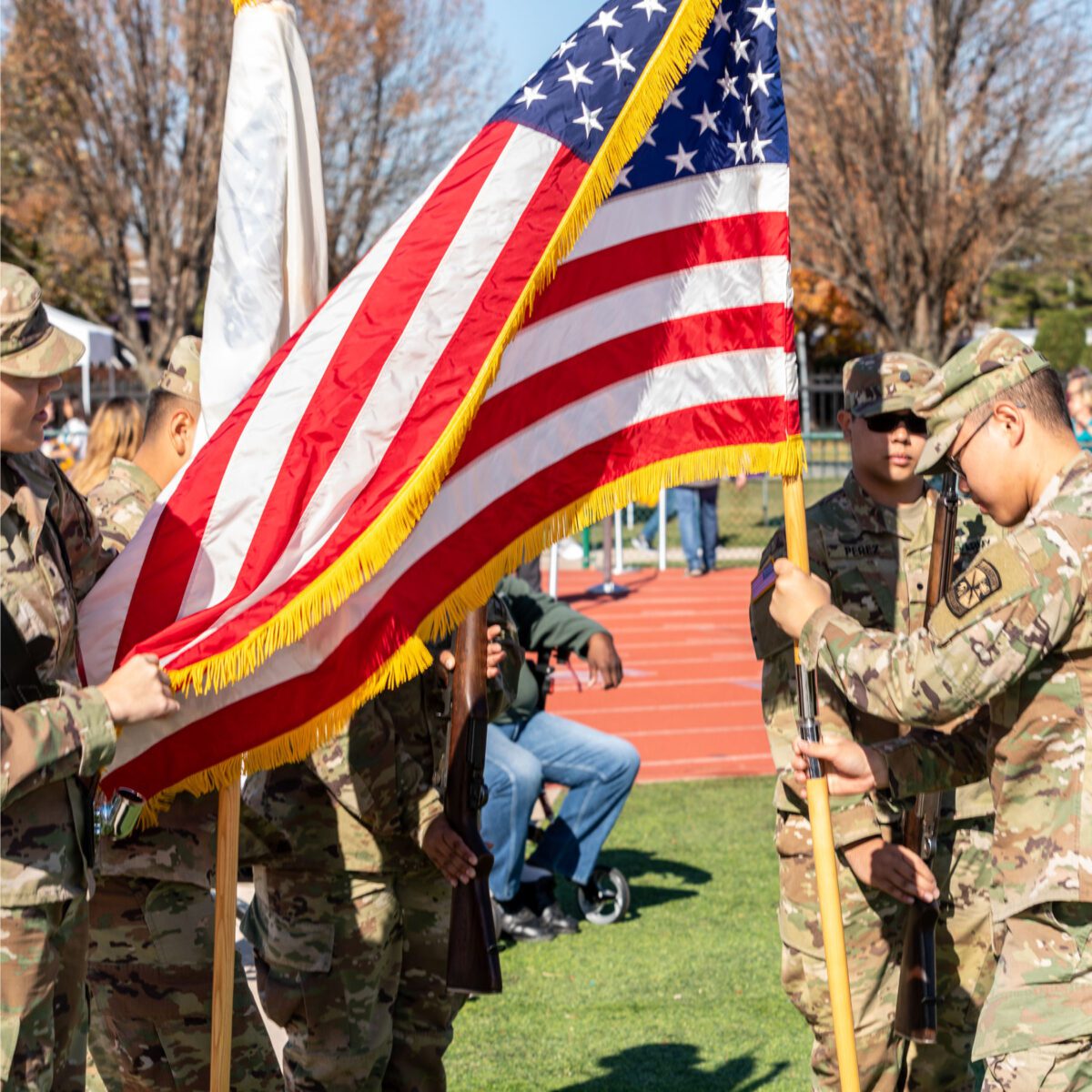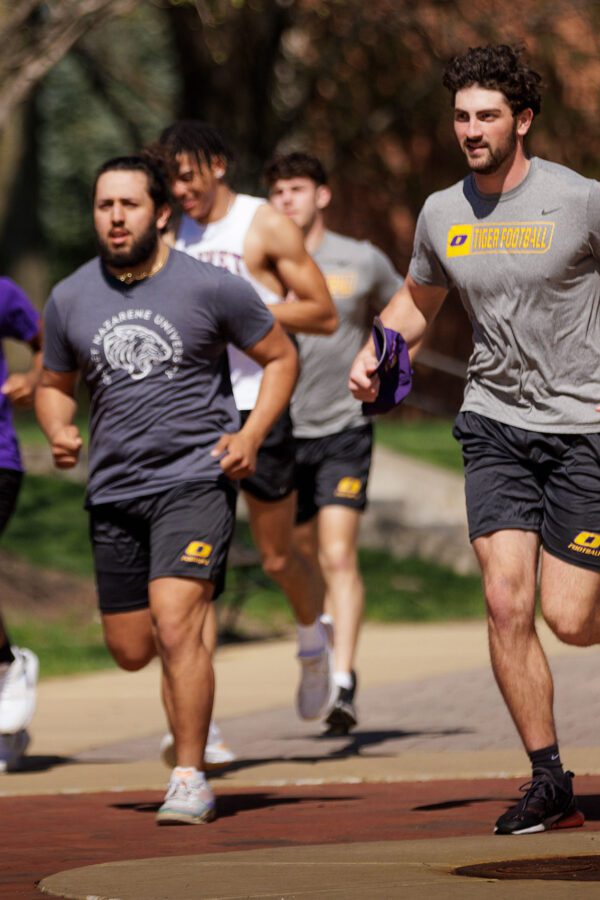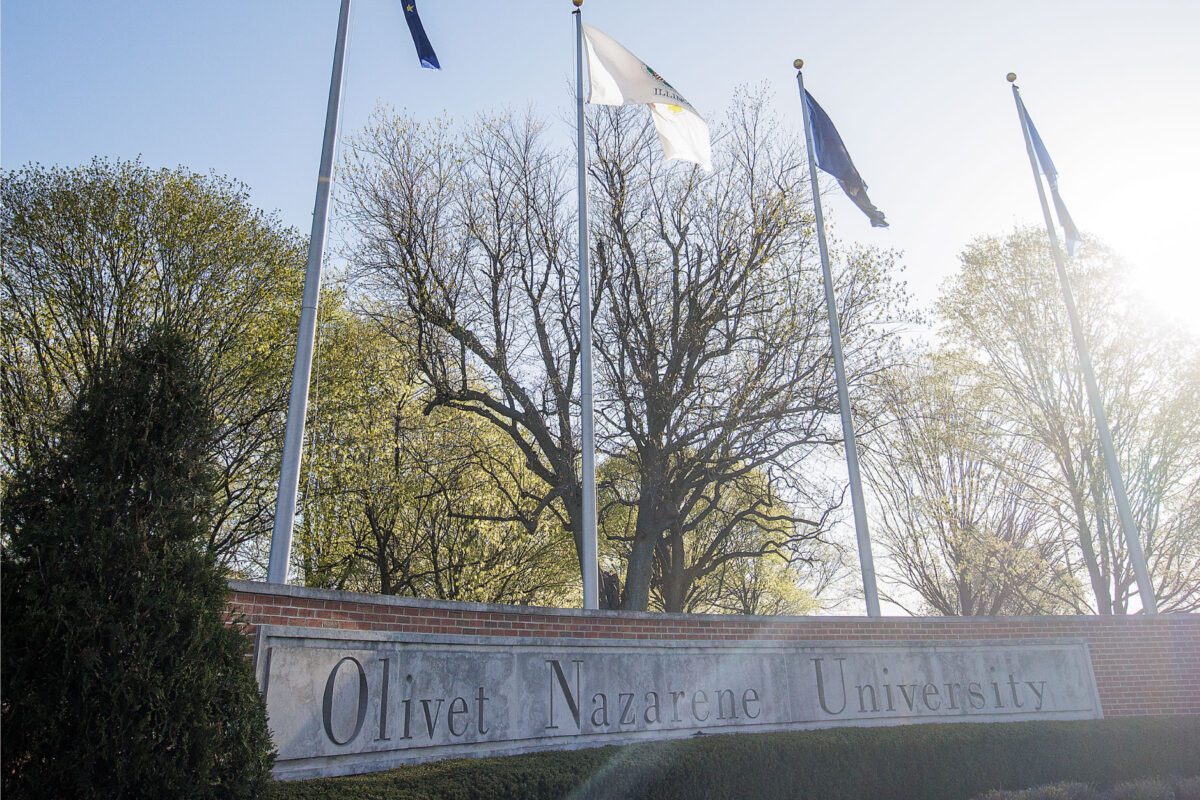Military Aid
Educational Benefits for Veterans & Service Members
America’s finest deserve to attend one of “America’s Best Colleges.” That’s why Olivet is proud to offer additional assistance to veterans and active duty service members through multiple GI Enhancement Programs, (including the GI Bill® ).

You may qualify
Educational Benefits for Veterans and Service Members
There are many types of Veterans Affairs (VA) educational benefits available to veterans and service members in the United States Armed Forces. To learn more about your eligibility, please visit the VA website or contact your Education Services Officer (ESO) at 888-442-4551. Along with the Chapter 33 benefits (Post 9/11) outlined below, students may qualify for other benefits that include:
- Chapter 30: Montgomery GI Bill – Active Duty
- Chapter 31: Veteran Readiness
- Chapter 35: Survivors and Dependents’ Educational Assistance
- Chapter 1606: Montgomery GI Bill – Selected Reserve
for veterans
Post-9/11 GI Bill®
Veterans who served a minimum of 90 days active duty after September 11, 2001 (or 30 continuous days and were discharged due to a service-connected disability), are eligible for education benefits under the Post-911 GI Bill® and may be eligible for additional benefits through the Yellow Ribbon Program.
The following information reflects amounts for traditional undergraduate students, however, benefits may be applicable to students in all of our graduate and degree-completion programs.
For more information about your benefits use the GI Bill® Comparison Tool.
Tuition and Fees
The VA will pay a maximum amount of $28,937.09 for the 2025-26 academic year. Students eligible for the maximum VA benefits under chapter 33 may qualify for the Yellow Ribbon Program, which could cover all additional costs over the annual maximum. Receipt of 100% VA educational benefits may result in an adjustment of institutional scholarships and grant aid. For students who receive the Illinois MAP Grant, a tuition only grant, the amount of the grant will be subtracted from tuition charges before the VA education benefits are applied.
Monthly Housing Allowance
This amount is based on the Basic Allowance for Housing (BAH) calculations. The monthly housing allowance is paid directly to the student after enrollment verification.
Annual Stipend for Books and Supplies
A maximum amount of $1,000 per year based on enrollment during the academic year.
WHO IS ELIGIBLE?
*The VA will make the final determination of your percentage of maximum benefits payable for the Post-9/11 GI Bill.



Yellow Ribbon Program
Olivet participates in the Yellow Ribbon GI Education Enhancement Program (Yellow Ribbon Program). A provision of the Post 9/11 Veterans Educational Assistance Act of 2008, this program provides matching funds from the Department of Veterans Affairs as a supplement to the Post-9/11 GI Bill®.
How it Works
After the Post-9/11 GI Bill® benefit is applied to those at the 100% benefit level, Olivet Nazarene University will offer assistance for half of the remaining tuition and the VA will match this amount. This allows qualified students to attend Olivet Nazarene University tuition-free.
The Yellow Ribbon Program covers tuition and mandatory fees. Other fees (parking, lab fees, etc.) are not included. These benefits will replace institutional scholarship grants. Yellow Ribbon recipients will also receive a monthly housing allowance and an annual stipend for books and supplies which are both sent from the VA directly to the student. Students who are eligible for the Illinois MAP Grant will have those funds applied before the GI Bill® and the Yellow Ribbon funds.
Program Benefits (Example)
| Type of aid | Scholarship |
| Olivet Nazarene University Tuition & Fees (based on 25-26) | $41,120.00 |
| Less: Post-9/11 GI Bill | $28,937.09 |
| Less: Olivet Nazarene Yellow Ribbon Waiver | $6,091.46 |
| Less: VA Yellow Ribbon Program Match | $6,091.45 |
| Amount Student Owes | $0.00 |
| Costs this aid can cover | Tuition and mandatory fees |
Who Qualifies?
Individuals who meet one of the following criteria:
- Served an aggregate period of at least 36 months after September 11, 2001
- Honorably discharged from active duty for a service-connected disability and served 30 continuous days after September 11, 2001
- Dependents eligible for Transfer of Entitlement under the Post-9/11 GI Bill®.
Transfer of Entitlement
The Department of Defense offers members of the Armed Forces the opportunity to transfer Chapter 33 Benefits to their spouse and/or dependent children. After the transfer has been approved, the spouse or child must apply with the VA before they can begin to receive Chapter 33 benefits. The application VA Form 22-1009e can be completed online through va.gov/education/how-to-apply/.
Once approved, the spouse or dependent child will need to submit his/her Certificate of Eligibility to Olivet Nazarene University.
Policies Related to Recruiting & Providing Services for Veterans
ONU will not provide any commission, bonus, or other incentive payment based in any part, directly or indirectly, upon success in securing enrollments or the award of financial aid, to any person or entity who is engaged in any student recruitment or admission activity, or in making decisions regarding the award of Title IV, HEA program funds. This restriction does not apply to the recruitment of foreign students residing in foreign countries who are not eligible to receive Federal student assistance. ONU will refrain from high-pressure recruiting tactics for purposes of securing service member enrollments. Examples of high pressure recruiting tactics would include making multiple unsolicited contacts (3 or more), including contacts by phone, email, or in-person, or engage in same-day recruitment and registration.
ONU will promptly readmit a service member with the same academic status as he/she had when last attending the school or when accepted for admission to the school. This requirement applies to any student who cannot attend school due to military service.
The student must notify the school VA representative of his/her military service and intention to return to school as follows:
- Notification of military service. The student (or an appropriate officer of the armed forces or official of the Department of Defense) must give oral or written notice of such service to the school as far in advance as is reasonable under the circumstances. The notice does not have to indicate whether the student intends to return to the school and may not be subject to any rule of timeliness. (Timeliness must be determined by the facts in each case.) Alternatively, at the time of readmission, the student may submit an attestation of military service that necessitated his/her absence from school. No notice is required if precluded by military necessity, such as service in operations that are classified or would be compromised by such notice.
- Notification of intent to return to school. The student must also give oral or written notice of his/her intent to return to the school within three years after the completion of the period of service. A student who is hospitalized or convalescing due to an illness or injury sustained or aggravated during the performance of service must notify the school within two years after the end of the period needed for recovery. A student who fails to apply for readmission within these periods does not automatically forfeit eligibility for readmission but is subject to the school’s established leave of absence and general practices.
- The school will promptly readmit the student into the next class or classes in the program beginning after he/she provides notice of intent to reenroll, unless he/she requests a later date or unusual circumstances require the school to admit him/her at a later date. This requirement supersedes state law-for example, the school will readmit a qualifying service member to the next class even if that class is at the maximum enrollment level set by the state.
- The school will admit the student with the same academic status, which means to the same program to which the student was last admitted or, if that exact program is no longer offered, the program that is most similar to that program, unless he/she chooses a different program;
- at the same enrollment status, unless the student wants to enroll at a different enrollment status;
- with the same number of credit hours or clock hours previously completed, unless the student is readmitted to a different program to which the completed credit hours or clock hours are not transferable, and
- with the same academic standing (e.g., with the same satisfactory academic progress status) the student previously had.
- If the student is readmitted to the same program, for the first academic year in which he/she returns, the school will assess the tuition and fee charges that he/she was or would have been assessed for the academic year during which he/she left the school. However, if his/her veterans education benefits or other service member education benefits will pay the higher tuition and fee charges that other students in the program are paying for the year, the school may assess those charges to the student instead.
- If the student is admitted to a different program, and for subsequent academic years for a student admitted to the same program, the school must assess no more than the tuition and fee charges that other students in the program are assessed for that academic year.
- The cumulative length of the absence and of all previous absences from the school for military service may not exceed five years. Only the time the student spends actually performing service is counted.
- Helping students to be readmitted and when it might not occur. If the school determines that the student is not prepared to resume the program with the same academic status at the point where he/she left off or will not be able to complete the program, the school will make reasonable efforts at no extra cost to help him/her become prepared or to enable him/her to complete the program. This includes providing refresher courses and allowing the student to retake a pretest at no extra cost.
The school is not required to readmit the student if it determines,
- that there are no reasonable efforts it can take to prepare him/her to resume the program at the point where he/she left off or to enable him/her to complete the program, or
- that after it makes reasonable efforts (those that do not place an undue hardship on the institution), the student is not prepared to resume or complete the program. “Undue hardship” means an action requiring significant difficulty or expense considering the overall financial resources of the school and the impact of such action on its operation.
The school has the burden to prove by a preponderance of evidence that the student is not prepared to resume the program with the same academic status at the point where he/she left off or that he/she will not be able to complete the program.
Finally, a student’s readmission rights terminate in the case of a dishonorable or bad conduct discharge, general court-martial, federal or state prison sentence, or other reasons as described in 34 CFR 668.18(h).
On April 27, 2012, the White House issued EO 13607, which created the Principles of Excellence for Educational Institutions Serving Service Members, Veterans, Spouses, and Other Family Members. Olivet has adopted these principles. They strengthen consumer protections for students who receive these benefits and provide access to information to help them make informed choices about their college education.
ONU’s financial aid and student debt statistics, including the cohort default rate, can be found here. Should the CDR ever exceed the national average, we will disclose here.
Tuition Assistance funds are earned proportionally during an enrollment period, with unearned funds returned based upon when a student stops attending. In instances where a service member stops attending due to a military service obligation, ONU will work with the affected service member to identify solutions that will not result in a student debt for the returned portion.
ONU will (a) Return any TA Program funds directly to the Military Service, not to the Service member. (b) Up to the start date, return all (100 percent) TA funds to the appropriate Military Service when the Service member does not: (i) Begin attendance at ONU; or (ii) Start a course, regardless of whether the student starts other courses. (c) Return any TA funds paid for a course that is cancelled by ONU.
ONU will return any unearned TA funds on a proportional basis through at least the 60 percent portion of the period for which the funds were provided.
ONU has designated a point of contact for the programs related to benefits for veterans. The contact information for this individual is listed at the top right of this page. This individual is trained and qualified in the TA program, the Department of Education Title IV funding, Veterans Affairs education benefits, and is familiar with institution-based services to service members who are seeking information about academic counseling, financial aid counseling, job search support, or other student support services at ONU.
